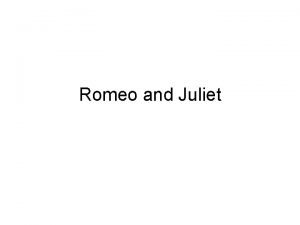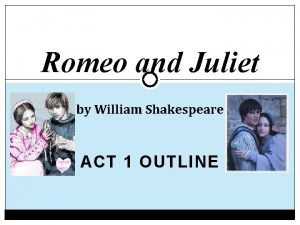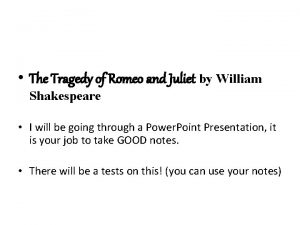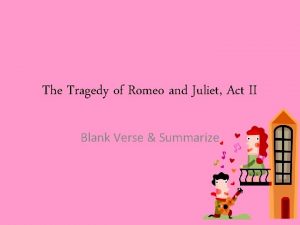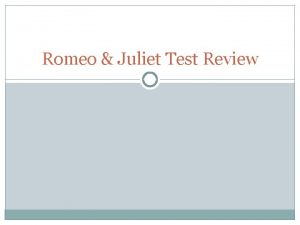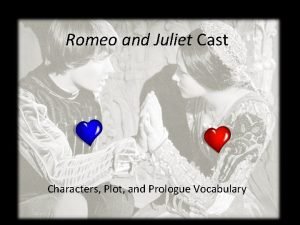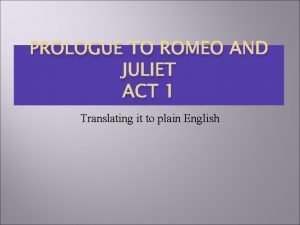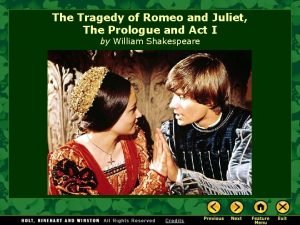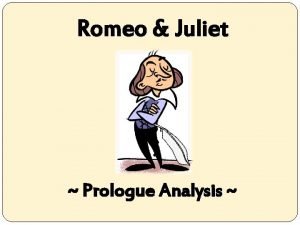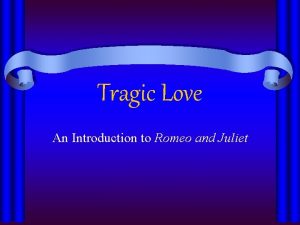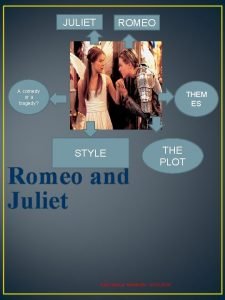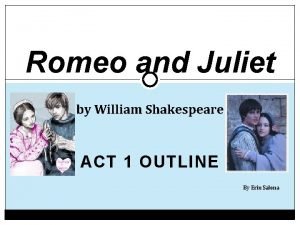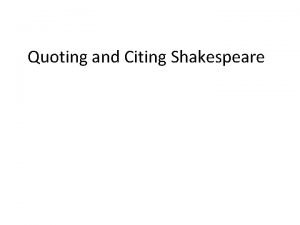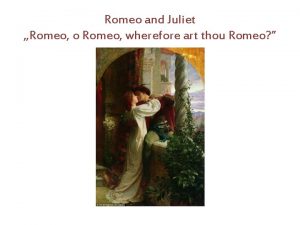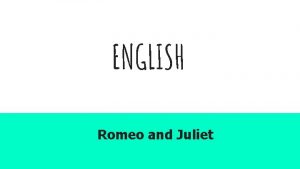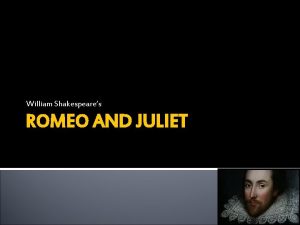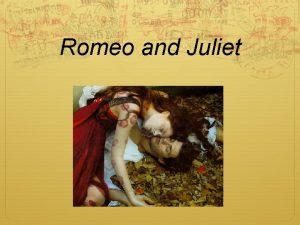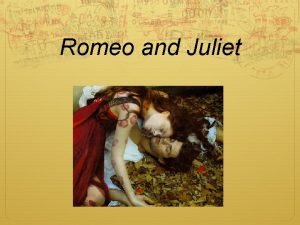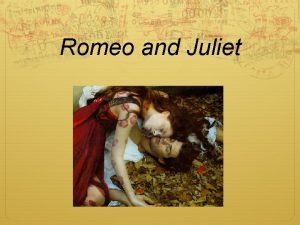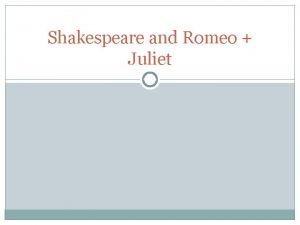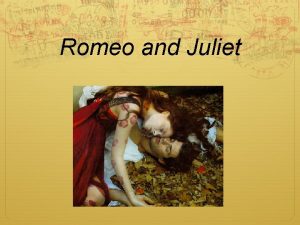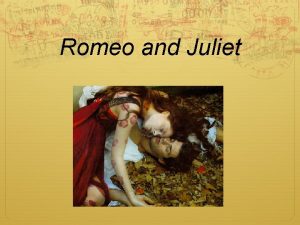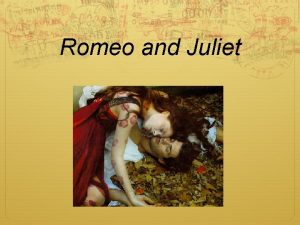The Tragedy of Romeo and Juliet William Shakespeare



























- Slides: 27

The Tragedy of Romeo and Juliet William Shakespeare 1564 -1616

PROLOGUE • Verona, Italy • Montagues & Capulets: – Generations of hate – Kids fall in love – Secret marriage – Suicide* – Families overcome the hate at tragic cost * (Foreshadows the deaths of Romeo & Juliet)

Act I • Purpose –Exposition of the play • Characters • Setting • Conflict

Act I, scene 1 • Old hatreds are rekindled between: – The servants of Capulets & Montagues – Tybalt and Benvolio – The Capulets & Montagues • Prince of Verona decrees: “If ever you disturb our streets again, your lives shall pay the forfeit of the peace” (I. 1. 94 -95).

Act I, scene 1 • Romeo Montague is heart-sick because he’s been rejected by Rosaline. • He asks his friend Benvolio, “ …teach me how I should forget to think!” (I. 1. 224) • Benvolio encourages, “By giving liberty unto thine eyes. Examine other beauties” (I. 1. 225 -226).

Shakespeare’s Purpose • Introduce the age-old feud between the Montagues & Capulets • Introduce Romeo as a romantic, moody teen who is sulking because of a breakup

Act 1, scene 2 • Paris, a young count, related to the Prince, asks Lord Capulet permission to marry his daughter Juliet. • Capulet asks Paris to wait until Juliet is a bit older than her present age – almost 14. • He then invites Paris to a party at his home to woo Juliet.

Act 1, scene 2 • Capulet asks his illiterate servant to deliver invitations to the party. • The servant happens upon Romeo and his pals, and asks them for assistance in reading the invitations. • Romeo sees Rosaline’s name on an invitation and decides to attend.

Act 1, scene 2 • Problem: The Capulets and Montagues are bitter foes. • Benvolio promises that he’ll assist Romeo in comparing Rosaline to other more beautiful women, and “. . . make thee think thy swan a crow” (I. 2. 89). • Romeo pouts that he’ll attend but have no fun.

Shakespeare’s Purpose • Plot device: – Used to shape the love triangle, bringing Romeo, Juliet and Paris together – Used to bring Romeo into enemy territory – a Montague in the Capulet home

Act I, scene 3 • Lady Capulet asks her daughter, Juliet, to “check out” Paris as a potential husband. • Juliet obediently complies, but lets her mother know that marriage is not something she’s been thinking about.

Act I, scene 3 • We meet Juliet’s nanny, the nurse, who is especially protective of her. • We also find out that Juliet’s 14 th birthday is approaching – Lammas Eve.

Shakespeare’s Purpose • The audience knows that Juliet is aware of Paris’ intent to marry her. • The audience also knows that there may be a brawl at the party because Romeo and his friends are infiltrating enemy territory.

Act I, scene 4 • Romeo, Benvolio, & Mercutio are about to crash the Capulet party. • Romeo vows he won’t have any fun because he’s depressed about Rosaline’s rejection: • “I am too sore enpierced with his [Cupid’s] shaft to soar with his light feathers. . . under love’s heavy burden do I sink” (I. 4. 19 -22).

Act I, scene 4 • A discussion ensues about love. • Romeo’s interpretation of love: – Emotional & Spiritual • Mercutio’s interpretation of love: – Physical & Bawdy

Act I, scene 4 • Romeo begins to tell his pals about an ominous dream he had. • Mercutio mocks him. • Romeo rebukes him, and then tells about his dream, which makes him reluctant to go to the party.

Act I, scene 4 • “my mind misgives some consequence yet hanging in the stars shall bitterly begin his fearful date with the night’s revels and expire the term of a despised life, closed in my breast, by some vile forfeit of untimely death” (I. 4. 106 -111).

Act I, scene 4 • In other words, –Romeo feels Fate has predetermined that some event tonight will cost him his life.

Shakespeare’s Purpose • Foreshadow Romeo’s death

Act I, scene 5 • Lord Capulet begins the party, inviting all to dance. • Romeo spies Juliet, and immediately falls heavily in love with her, instantly forgetting about Rosaline:

Act I, scene 5 • “O, she doth teaches the torches to burn bright! It seems she hangs upon the cheek of night as a rich jewel in an Ethiop’s ear – Beauty too rich for use, for earth too dear!” (I. 5. 45 -48).

Act I, scene 5 • Tybalt, Lady Capulet’s nephew, spies Romeo, recognizes him as a Montague, and prepares to kill him. • Lord Capulet orders Tybalt to “endure” Romeo’s presence, remembering the Prince’s decree. • Tybalt obeys begrudgingly, but will seek revenge at another time:

Act I, scene 5 • Tybalt remarks after Lord Capulet has exited: – “I will withdraw; but this intrusion shall, now seeming sweet, convert to bitt’rest gall*” (I. 5. 92 -93)

Act I, scene 5 • The Infatuation • The Kiss • The Enemy

Act I, scene 5 • Romeo and Juliet’s attraction is immediately electric – love at first sight! • Yet, when they kiss they do not know each other’s identity. • Juliet’s nurse breaks the news to each.

Act I, scene 5 • Romeo’s reaction: – “Is she a Capulet? O dear account! My life is my foe’s debt” (I. 5. 118 -119). • Juliet’s response: – “My only love, sprung from my only hate!. . . Prodigious of love it is to me that I must love a loathed enemy” (I. 5. 140 -143).

Shakespeare’s Purpose • Foreshadow the death of Mecutio at the hands of Tybalt • Introduce the conflict that sets the plot in motion. – Ironically Romeo & Juliet, whose families are embroiled in a bitter family feud, fall madly in love.
 Juliet
Juliet The tragedy of romeo and juliet by william shakespeare
The tragedy of romeo and juliet by william shakespeare Macbeth plot
Macbeth plot Who wrote romeo and juliet
Who wrote romeo and juliet Juliet facts
Juliet facts J5l-production oy
J5l-production oy Romeo and juliet script romeo romeo where
Romeo and juliet script romeo romeo where Macbeth resumen
Macbeth resumen An introduction to shakespeare and romeo and juliet part 1
An introduction to shakespeare and romeo and juliet part 1 Catharsis romeo and juliet
Catharsis romeo and juliet The tragedy of romeo and juliet
The tragedy of romeo and juliet Romeo and juliet blank verse
Romeo and juliet blank verse The tragedy of romeo and juliet test review answer key
The tragedy of romeo and juliet test review answer key Romeo and juliet plot
Romeo and juliet plot Romeo juliet prologue
Romeo juliet prologue Iambic pentameter in romeo and juliet
Iambic pentameter in romeo and juliet Romeo ve juliet
Romeo ve juliet Romeo and juliet introduction
Romeo and juliet introduction Is romeo and juliet a comedy or tragedy
Is romeo and juliet a comedy or tragedy Shakespeare romeo and juliet characters
Shakespeare romeo and juliet characters Blank verse example romeo and juliet
Blank verse example romeo and juliet Shakespeare sonnet romeo and juliet
Shakespeare sonnet romeo and juliet Romeo in act 1
Romeo in act 1 Romeo and juliet themes
Romeo and juliet themes How do you cite a quote from a play
How do you cite a quote from a play Mercutio meaning
Mercutio meaning Who said o romeo romeo where for arthous romeo
Who said o romeo romeo where for arthous romeo Romeo and juliet quotes act 1 scene 2
Romeo and juliet quotes act 1 scene 2



